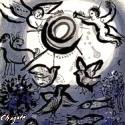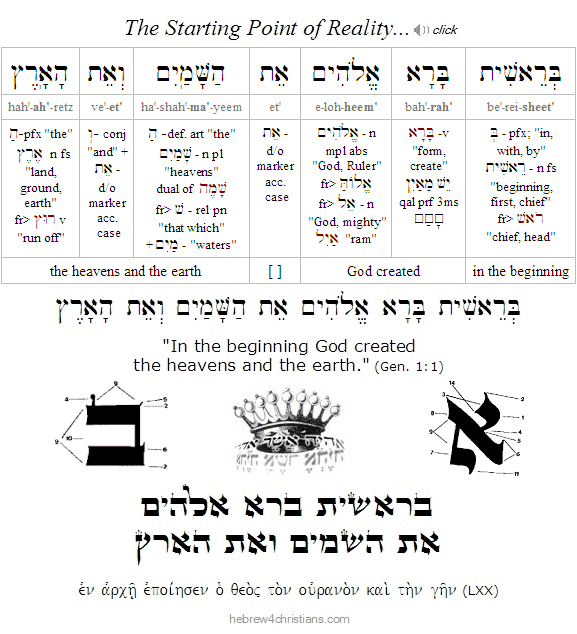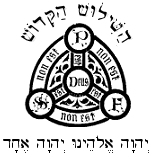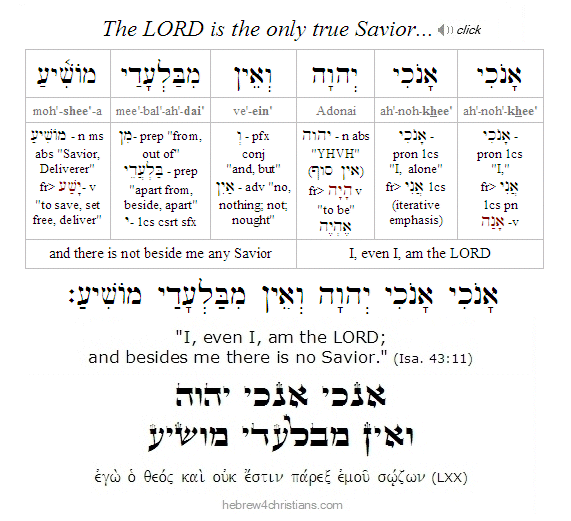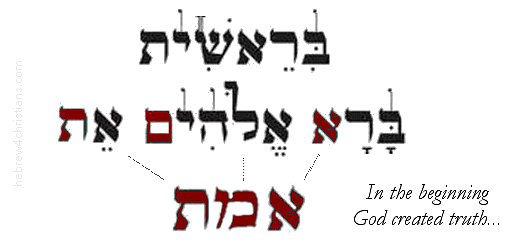|
|
|||||||||||||||||||||
 |
|||||||||||||||||||||
 |
|||||||||||||||||||||
|
|
||||||||||||||||||||||||||||
|
During the holiday of Simchat Torah we "rewind the scroll" to begin reading the Torah again for another year, and therefore it is an opportune time to remind ourselves about how the language of the Torah itself begins: "In the beginning God created the heavens and the earth" (Gen. 1:1). In this connection note that the Torah begins with a Voice speaking from an omniscient, "third person" perspective. Therefore when we read, "In the beginning, God (אֱלהִים) created the heavens and the earth," we must ask who exactly is speaking? In other words, who is the narrator of the Torah? The next verse states that the Spirit of God (רוּחַ אֱלהִים) was hovering over the face of the waters (Gen. 1:2), followed by the first "direct quote" of God Himself: i.e., יְהִי אוֹר: "Let there be light" (Gen. 1:3). The creative activity of Elohim (God) and the presence of Ruach Elohim (the Spirit of God) are therefore narrated by an omniscient Voice or "Word of God" (i.e., davar Elohim: דְּבַר הָאֱלהִים). Obviously the Spirit of God is God Himself, just as the Word of God is likewise God Himself, and therefore the first verses of the Torah reveal the nature of the Godhead. God is One in the sense of echdut, "unity," "oneness," and and so on, though not "one" in the monistic sense of a solipsistic mind (νοῦς). God is beyond all theological predications: there can be no sense of "person" apart from relationship, and therefore God's Personhood entirely transcends all our finite conceptions - and yet God forever is One.
The Word of of Creation The Torah begins with the declaration, "In the beginning Elohim (God) created" (בְּרֵאשִׁית בָּרָא אֱלהִים), where the Hebrew word "Elohim" is written in the grammatical plural form (i.e., אֱלהִים, derived from the singular form אֵל, God), not because there is more than one Creator, of course, since indeed the verb bara (בָּרָא) used in this very declaration is grammatically singular, that is, "He created." Of course the Torah clearly affirms that "God is one" (יְהוָה אֶחָד), though note that the word "one" (i.e., echad: אֶחָד) means something more than mere numerical identity (i.e., yachid: יָחִיד) but instead unity in plurality, a "transcendental" oneness that points to the unfathomable mystery of the Name YHVH and the unity of the Godhead (אֵין סוֹף). Therefore the plural name Elohim is sometimes called "pluralis intensitatis" which denotes in one Person all the powers and influences by which the universe was first created and now is governed and sustained... שְׁמַע אֵלַי יַעֲקב וְיִשְׂרָאֵל מְקרָאִי she-ma · ei-lai - ya-a-kohv · ve-yees-rah-eil · me-koh-rah-ee "Listen to me, O Jacob, and Israel, whom I called.
קִרְבוּ אֵלַי שִׁמְעוּ־זאת kee-re-voo · ei-lai · sheem-oo · zoht "Draw near to me, hear this: "Draw near to me, hear this: from the beginning I have not spoken in secret, from the time anything came to be there I AM, and now the Lord GOD has sent me, and his Spirit" (Isa. 48:16). Note in this verse the strong intimation of the transpersonal unity (echdut) nature of ha'shilush ha'kodosh, or the ineffable Godhead.... Of course the Torah clearly affirms that "God is one" (יְהוָה אֶחָד), though note that the word "one" (i.e., echad: אֶחָד) means something more than mere numerical identity (i.e., yachid: יָחִיד) but instead unity in plurality, a "transcendental" oneness that points to the unfathomable mystery of the Name YHVH and the tri-unity of the Godhead (אֵין סוֹף). Note further that the Shema is composed of three parts yet is one affirmation, and the great birkat Kohanim, or the "priestly blessing," is composed of three stanzas that use the Name YHVH three times. The Tabernacle, or Mishkan, was composed of three separate sections, with the inmost chamber holding the sacred "three-in-one" box called the Ark of the Covenant... Space is defined in terms of three dimensions, as is time (i.e., past, present, future). God has not spoken in secret, friends. "Who has ascended to heaven and come down? Who has gathered the wind in his fists? Who has wrapped up the waters in a garment? Who has established all the ends of the earth? What is his name, and what is his son's name? Surely you know!" (Prov. 30:4).
|
|
Hebrew for Christians |
|||||
|
|||||
